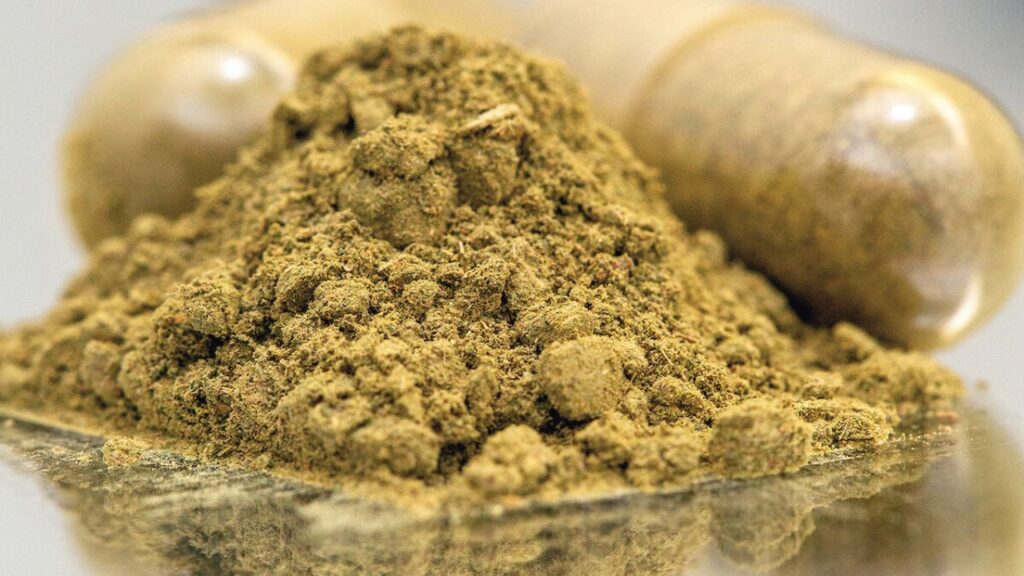Is Kratom Illegal In California? Kratom is currently legal in California, except for San Diego where a local ordinance bans its sale and use.
Kratom has been a subject of substantial discussion in recent years. It is an herbal supplement originating from the leaves of the Mitragyna speciosa tree.
Kratom has been typically used for its therapeutic effects, starting from ache comfort to stamina improvement and it was born in Southeast Asia.
As it gains popularity in the United States, concerns over its safety, efficacy, and legal status have surfaced, leading to a complex patchwork of regulations across the country.
This article takes an in-depth look at whether Kratom is illegal in California, its current legal status, potential risks, and what the future may hold for Kratom enthusiasts in the state.
Contents
What is Kratom?
Definition and Origin:
Kratom (Mitragyna speciosa) is a tropical evergreen tree that is a member of the coffee family. It develops mainly in Southeast Asia, particularly in countries like Thailand, Malaysia, Indonesia, and Papua New Guinea.
The leaves of the Kratom tree have been utilized for centuries by regional residents for their psychoactive and therapeutic effects. [Is Kratom Illegal In California?]
Traditional uses include chewing the fresh leaves, brewing them into tea, or smoking them to combat fatigue, relieve pain, and enhance mood.
The fundamental compounds in Kratom, particularly mitragynine and 7-hydroxymitragynine, bind to opioid receptors in the brain. At lower doses, they produce stimulating effects, while at higher doses, they have more sedative properties.
Uses and Benefits:
Kratom has been widely adopted in Western countries, particularly in the United States, as an alternative remedy for various conditions. [Is Kratom Illegal In California?]
Some of the most common uses include managing chronic pain, alleviating symptoms of anxiety and depression, enhancing energy and focus, and assisting with opioid withdrawal.
Many users view Kratom as a natural alternative to prescription opioids and antidepressants, claiming fewer side effects and a lower risk of addiction.
However, despite anecdotal evidence supporting its benefits, Kratom has not been approved by the Food and Drug Administration (FDA) for any medical use, and scientific research is still in its early stages.
Current Legal Status of Kratom in California
State-Wide Legality:
In California, Kratom is legal to buy, sell, possess, and use at the state level. Unlike states such as Alabama, Arkansas, Indiana, Vermont, Rhode Island, and Wisconsin, which have completely banned Kratom, California has taken a more liberal stance.
The lack of state-wide regulation means that Kratom products can be sold in various forms, including powders, capsules, tinctures, and extracts, without specific legal repercussions.
Consumers have the freedom to purchase Kratom from local stores, smoke shops, or online vendors. [Is Kratom Illegal In California?]
This relatively lenient approach reflects California’s broader stance on alternative and herbal medicine, where substances are often legal unless proven to be significantly harmful.
Local Ordinances and Exceptions:
Despite Kratom’s state-wide legality, local governments in California have the authority to regulate or ban substances within their jurisdictions.
San Diego, one of California’s largest cities, implemented a ban on Kratom in 2016 under its “Synthetic and Psychoactive Drug Ban.”
This ordinance was enacted due to concerns over Kratom’s safety, potential for addiction, and reported adverse effects. Under this ban, the sale, possession, and use of Kratom are illegal, with penalties for those caught violating the law.
While San Diego is the most notable example, other cities like Oceanside have considered similar bans, though they have yet to pass any restrictive legislation.
As a result, Kratom consumers and sellers must remain vigilant and stay informed about local regulations. [Is Kratom Illegal In California?]

Why is Kratom Legal in California?
Regulatory Environment:
California’s approach to regulating herbal supplements and alternative medicines has historically leaned towards a more permissive model.
Unlike some states that have chosen to ban substances like Kratom due to safety concerns or a lack of FDA approval, California generally allows such products to be sold and consumed, provided there is no overwhelming evidence of significant harm.
The state’s regulatory framework focuses on consumer protection and education rather than outright prohibition. [Is Kratom Illegal In California?]
This strategy aligns with California’s broader progressive stance on health and wellness, favoring less restrictive measures unless there is a clear and present danger.
Public and Legal Opinions:
The debate over Kratom’s legality is characterized by polarized opinions. Supporters of Kratom argue that it provides a valuable alternative for individuals managing chronic pain, anxiety, or opioid dependence, particularly at a time when the opioid crisis remains a significant public health concern.
They highlight Kratom’s potential benefits and advocate for regulated access rather than prohibition. [Is Kratom Illegal In California?]
On the other hand, opponents point to reports of adverse effects, potential for misuse, and the absence of regulatory oversight, advocating for stricter regulations or outright bans.
This divergence in public and legal opinion has contributed to Kratom’s current status, where it remains legal at the state level, but subject to local regulations.
Risks and Controversies Surrounding Kratom
Health Concerns:
While Kratom has its share of proponents, it is not without risks. Public health agencies such as the FDA and the Centers for Disease Control and Prevention (CDC) have raised concerns about the potential health effects associated with Kratom use.
These concerns include the risk of addiction, as Kratom’s alkaloids interact with opioid receptors, potentially leading to dependency and withdrawal symptoms. [Is Kratom Illegal In California?]
In high doses, Kratom can cause sedation, respiratory depression, and even death, especially when mixed with other substances like alcohol or opioids.
Other reported side effects include liver toxicity, seizures, hallucinations, and cardiovascular issues. Given these risks, several health organizations have urged caution and called for more research to better understand Kratom’s safety profile.
Regulatory Concerns:
Regulatory bodies such as the FDA have not approved Kratom for any medical use, citing a lack of robust scientific evidence on its safety and efficacy. [Is Kratom Illegal In California?]
As a result, Kratom products are not subject to standard quality control measures, leading to concerns about contamination, adulteration, and inaccurate labeling.
This lack of regulation means that consumers may be exposed to unsafe or substandard products, heightening the risk of adverse effects.
In California, the absence of state-level regulation leaves the door open for local municipalities to step in and regulate Kratom within their jurisdictions, creating a fragmented legal landscape.

Future of Kratom Legality in California
Potential Changes in Legislation:
The future of Kratom’s legal status in California is uncertain and could change depending on various factors, including new research, public health data, and advocacy efforts.
If more conclusive evidence emerges regarding its potential harms, lawmakers may consider imposing stricter regulations or a state-wide ban on Kratom.
Conversely, if research supports Kratom’s benefits and demonstrates a favorable safety profile, there could be moves to protect its legality further or introduce a regulated market.
Advocacy groups, such as the American Kratom Association, are actively lobbying to keep Kratom legal and accessible, pushing for regulations that ensure product quality and consumer safety.
Advocacy and Public Opinion:
The debate over Kratom’s future in California is heavily influenced by advocacy groups, both for and against its use.
Organizations like the American Kratom Association argue that banning Kratom would drive it underground, leading to unregulated markets and potentially more dangerous situations for consumers.
They advocate for self-regulation within the industry, including good manufacturing practices, product labeling, and consumer education.
Meanwhile, public health officials, medical professionals, and some local governments express concerns over Kratom’s unregulated sale and potential for abuse, calling for stricter controls.
As this debate continues, public opinion will play a crucial role in shaping Kratom’s legal landscape in California. [Is Kratom Illegal In California?]
Final Verdict
As it stands, Kratom is legal in California, except in San Diego, where local ordinances prohibit its sale and use. [Is Kratom Illegal In California?]
While there are no state-wide restrictions, local governments have the authority to impose their regulations based on community needs and safety concerns.
The absence of a unified legal framework means that Kratom users and vendors must stay informed about both state and local laws that could impact their ability to purchase, sell, or use Kratom.
Given the ongoing debates and potential for future legislative changes, it is essential to keep an eye on the evolving landscape surrounding Kratom.
See Also: Are Balisongs Illegal In Florida? Florida’s Knife Laws!
FAQs
Is Kratom legal throughout California?
Yes, Kratom is legal in California at the state level, but it is banned in certain cities like San Diego due to local ordinances. [Is Kratom Illegal In California?]
Why is Kratom banned in San Diego?
San Diego banned Kratom in 2016 under the “Synthetic and Psychoactive Drug Ban” ordinance due to concerns over health risks, potential for addiction, and reported adverse effects.
Are there any risks associated with using Kratom?
Yes, risks include the potential for addiction, liver toxicity, seizures, cardiovascular issues, and adverse interactions with other substances, especially at high doses.
Could California ban Kratom in the future?
The future of Kratom’s legality in California is uncertain. It could face further regulation or a state-wide ban depending on new research, advocacy, and public health campaigns.
Where can I legally purchase Kratom in California?
Kratom can be purchased in areas of California where it is legal, including most cities and counties except for places like San Diego where local bans exist.
Conclusion: Is Kratom Illegal In California?
Kratom’s legal status in California reflects a broader national conversation about its safety, benefits, and risks. [Is Kratom Illegal In California?]
While California has opted for a more permissive approach at the state level, local governments have taken it upon themselves to regulate its use based on their specific concerns.
For Kratom users and sellers, staying informed about both state and local laws is crucial, as these regulations are subject to change.
As research continues and public opinion evolves, the legal landscape for Kratom in California may shift, making it essential for all stakeholders to remain vigilant and proactive in understanding their rights and responsibilities.

Hello guys, I’m Trey Simpson from Los Angeles. After completing my J.D., I noticed a lack of clear information online about laws in different U.S. states. So, I created this blog to help. Now, I’m a lawyer and continue blogging. Thanks for visiting!

